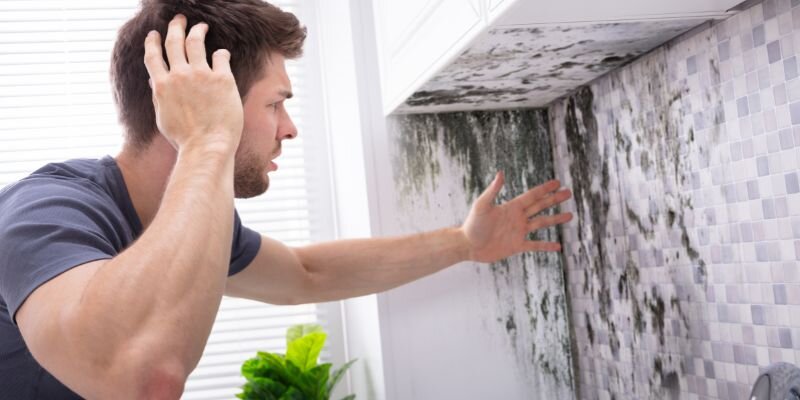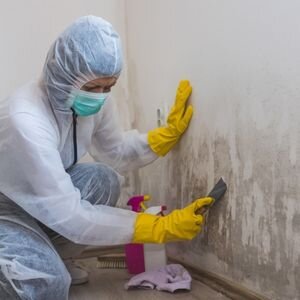
Understanding the Impact of Mold on Property Value in Washington
When selling a house with mold in Washington, it’s crucial for homeowners to understand how mold can significantly affect property value. Mold is not just a cosmetic issue; it raises serious health concerns and can deter potential buyers.
Mold grows a lot in Washington because of the wet weather, therefore it’s even more important to deal with it. Buyers often make lesser offers on homes that have mold or have had mold problems in the past because they know how much it will cost and how much work it would take to fix the problem.
If mold is not dealt with, it can affect the structure of a home, making it much harder to sell. In Washington, sellers must also tell purchasers about any known mold problems, which might affect negotiations and lower the price of the home.
To maximize property value despite the presence of mold, homeowners should consider professional inspection and remediation services to effectively address the problem before listing their home on the market.
How Weather Conditions Affect Mold Growth and House Sales in Washington
In Washington, the state’s unique climate significantly influences mold growth in homes, impacting real estate transactions. The Pacific Northwest is known for its wet and humid conditions, which create an ideal environment for mold proliferation.
Homeowners who want to sell their homes need to be extra careful about controlling moisture to avoid mold problems that could turn off potential purchasers. Basements, attics, and other places where water might get in are always damp because of constant rain, overcast weather, and high humidity.
This persistent moisture can accelerate mold growth, making it crucial for sellers to address any signs of mold promptly before listing their house on the market. Failure to do so can lead to complications during inspections and potentially lower offers from buyers concerned about health risks associated with mold exposure.
By understanding how Washington’s weather conditions promote mold development, homeowners can take proactive steps such as improving ventilation and conducting thorough inspections to ensure a smoother selling process in this competitive real estate market.
Identifying Common Types of Mold Found in Washington Homes
When selling a house with mold in Washington, it is crucial for homeowners to identify the common types of mold that may be present. Washington’s damp climate creates an ideal environment for mold growth, making it vital to recognize various strains to address them effectively.
Cladosporium is one of the most common molds in homes in Washington. It grows well on wood and materials and usually looks like a green or black powder. You may also see aspergillus, which is another common type that grows in damp places like bathrooms and kitchens and can be yellow to green.
Stachybotrys chartarum, commonly referred to as black mold, is notorious for producing mycotoxins and typically grows on materials like paper and fiberboard when moisture intrusion occurs. Recognizing these molds early can help homeowners take appropriate action to remediate the problem before listing their property for sale.
Understanding the specific types of mold found in Washington homes allows sellers to communicate effectively with potential buyers and address any concerns related to indoor air quality and health risks associated with mold exposure.
Assessing Mold Severity: When to Consult a Professional

When selling a house with mold in Washington, accurately assessing the severity of the mold problem is crucial for a successful sale. Homeowners must first determine whether the mold issue is superficial or indicative of deeper structural problems.
Minor surface mold can often be handled with simple cleaning solutions and proper ventilation; however, significant infestations may require professional intervention. Consulting a licensed mold remediation expert is advisable when the affected area exceeds ten square feet, or if the mold is found in hard-to-reach places such as inside walls or HVAC systems.
Professionals are equipped to conduct thorough inspections, identify hidden moisture sources, and provide detailed reports that help homeowners understand the extent of contamination. Their expertise is particularly valuable when dealing with black mold or other toxic varieties that pose health risks.
In Washington’s humid climate, failing to address these issues properly can lead to liabilities and deter potential buyers during home inspections. Therefore, involving a professional ensures that all necessary disclosures are made and any remediation efforts meet local regulations, ultimately protecting both sellers and future occupants.
How to Choose a Reliable Mold Inspection Service in Washington
If you’re selling a house in Washington that has mold on it, you need to make sure you hire a trusted mold inspection service. Because it rains a lot in Washington, homeowners should only hire companies that are qualified and know how to deal with mold problems in that state.
It is important to find testers who have credentials from trustworthy groups like the Indoor Air Quality Association (IAQA) or the American Council for Accredited Certification (ACAC). You can find out about an inspector’s dependability and thoroughness by reading reviews and calling their references.
Also, reports can be more accurate if you choose a local service that knows how the environment works in Washington. With the help of modern tools like infrared cameras or moisture meters, a good service will not only find mold that can be seen, but also mold that is hidden.
Ensuring that the chosen company provides detailed reports outlining the extent of mold contamination and recommended remediation strategies is crucial. By doing so, homeowners can address mold issues effectively before listing their property, thereby enhancing its marketability and minimizing potential disputes during the sale process.
Steps to Remediate Mold Before Putting Your Home on the Market
If you want to sell your home in Washington, you need to take care of any mold problems. Before putting your house on the market, the first step in getting rid of mold is to do a comprehensive inspection to find all the places where mold has grown.
A skilled mold inspector can provide you an accurate report and find mold that you might not see. After finding mold, it’s important to remedy any moisture problems that may be causing it, such leaks or bad ventilation.
Engaging a certified mold remediation specialist ensures that the removal process is conducted safely and effectively, following state regulations and guidelines. This typically involves sealing off contaminated areas, using specialized equipment to remove the mold, and applying antimicrobial treatments to prevent recurrence.
It’s a good idea to have the property inspected again to make sure that all the mold has been removed. To protect the health of future residents, these steps are important. They also make your home more appealing and valuable in a competitive real estate market.
Legal Requirements for Selling a Mold-infested House in Washington
When selling a house with mold in Washington, homeowners must navigate several legal requirements to ensure a successful transaction. Under Washington state law, sellers are obligated to disclose any known material defects, including mold infestations, through the Form 17 Seller Disclosure Statement.
This form needs specific information about the state of the property, and if you don’t give accurate information, you could face legal consequences or financial liability. Also, local health regulations may have specific mold removal requirements that must be met before the property can be put on the market.
It is crucial for sellers to obtain professional inspections and possibly hire certified mold remediation experts to address significant issues. Engaging with experienced real estate professionals familiar with Washington’s disclosure laws can help streamline this process and assist in determining whether it’s necessary to provide buyers with further documentation regarding any remedial work completed.
In addition to protecting sellers, openness and adherence to these regulatory requirements foster trust with potential purchasers, allowing for more seamless negotiations and maybe increasing the property’s marketability even in the face of mold issues.
Preparing Disclosure Statements for Mold Issues in Real Estate Transactions
When selling a house with mold in Washington, homeowners need to make sure that their disclosure statements are clear so that the real estate transaction is clear. Washington state law says that sellers must tell potential buyers about any known material deficiencies, such as mold problems.
To follow these rules, homeowners should carefully record all cases of mold, including where it happened and how bad the damage was. It’s a good idea to include details about any cleanup that was done, like hiring professionals to get rid of the mold or taking steps to stop it from spreading. The Sell My House Fast For Cash Team can assist in documenting these efforts and guiding you through the disclosure process to ensure compliance and protect your sale.
Providing detailed records and inspection reports can help build trust with buyers and potentially avoid legal repercussions down the line. Consulting with a real estate attorney or agent familiar with Washington’s disclosure requirements can also be beneficial in crafting comprehensive statements that accurately convey the property’s condition while protecting the seller’s interests during the sale process.
Protecting Yourself Legally When Disclosing and Addressing Household Mold
When selling a house with mold in Washington, it’s crucial to protect yourself legally by thoroughly disclosing the presence of mold to potential buyers. Washington state law mandates sellers to disclose any known material defects, including mold, which could impact the property’s value or safety.
To ensure compliance and minimize liability, homeowners should obtain a professional mold inspection and provide documentation of any remediation efforts undertaken. Employing a qualified real estate attorney can help navigate disclosure requirements and draft clear agreements that outline both parties’ responsibilities regarding mold issues.
Getting rid of mold in your home the right way not only builds trust with buyers but also keeps you out of future legal trouble. Being honest about your property’s condition and taking steps to deal with mold issues will protect you from possible claims and make the transaction process go more smoothly.
Marketing Strategies for Selling a House with Mold Concerns
If someone wants to sell a house in Washington that has mold problems, they need to use good marketing techniques that address potential buyers’ concerns while promoting the property’s good points. Start by being honest about the mold problem and any attempts to fix it.
This honesty builds trust and can alleviate buyer apprehension. Consider obtaining a professional mold inspection report to provide assurances about the extent of the problem and any remedial actions taken.
Highlighting these details in your listing can attract buyers who value transparency and are willing to deal with minor issues when they feel informed. Emphasize other appealing features of the home, such as its location, layout, or recent upgrades, to balance out concerns about mold.
Professional staging can also help showcase the home’s potential by creating a welcoming atmosphere that allows prospective buyers to envision themselves living there. Utilize high-quality photographs that capture the property’s best angles while ensuring all areas appear clean and well-maintained.
Also, working with an experienced real estate professionals who knows how to market homes with unique problems can be very helpful. They can write compelling stories that focus on both honesty and opportunity, targeting buyers who value full disclosure while seeing the potential in a property that needs some TLC.
Staging Tips to Minimize Buyer Concerns About Previous Mold Damage

If you’re trying to sell a house in Washington that has had mold problems in the past, you need to make sure it’s staged well so that buyers don’t worry and the best features can be seen. First, clean and deodorize the house well to get rid of any musty smells that could mean there were mold problems in the past.
Ensure that all areas previously affected by mold are professionally remediated and repaired, with documentation available to reassure potential buyers. Use neutral, fresh paint colors on walls to create a clean and inviting atmosphere.
Keep windows clean and use sheer curtains or blinds to let in as much natural light as possible. Bright rooms can help ease worries that water or darkness could be causing mold to grow. Place plants in your home in a smart way to improve the air quality and add some color.
Highlight well-ventilated areas like kitchens and bathrooms, showcasing any improvements such as modern ventilation systems or dehumidifiers that prevent future mold problems. By focusing on these elements, you can present your home as a safe, healthy environment while addressing any residual worries about past mold damage.
Negotiating Price Adjustments Due to Mold Complications in Washington Homes
When selling a house in Washington that has mold issues, negotiating price adjustments becomes a crucial aspect of the transaction. Homeowners need to understand that buyers are often wary of properties with mold due to potential health risks and remediation costs.
Therefore, being transparent about the presence of mold and providing documentation from professional mold inspections can build trust and facilitate negotiations. In Washington’s real estate market, sellers might consider adjusting the listing price to reflect anticipated remediation expenses, which can vary significantly depending on the severity and location of the mold problem.
During negotiations, providing credits or allowances for mold treatment can further increase the property’s desirability to potential purchasers. Additionally, it is crucial to understand local disclosure rules because it might result in legal concerns if buyers are not informed about known mold hazards.
By effectively navigating these discussions and addressing buyer concerns upfront, homeowners can achieve a successful sale despite the challenges posed by mold complications in their Washington home. To better prepare for each step, learn how our process works and see how we help simplify complex home sales.
Highlighting Positive Aspects: Selling Points Beyond Mold Issues
When people in Washington try to sell a house that has mold problems, they need to make sure they highlight the good things about the house that will make it appealing to buyers. Bringing attention to things like a great location, a large layout, or recent renovations can take the attention off of mold worries.
A well-maintained garden, energy-efficient appliances, or proximity to schools and parks can be significant selling points. Homeowners should also underscore any unique architectural details or high-quality materials used in construction.
By showing these things, sellers can show that the home has worth and potential beyond the mold problems that are already there. Also, telling buyers about the steps that have been taken to deal with mold problems, like hiring professionals to clean up the problem or making the ventilation systems better, can reassure them about the property’s state and its suitability for living in the future.
Crafting an Effective Sales Pitch to Buyers Aware of Potential Mold Problems
When selling a house with mold in Washington, crafting an effective sales pitch is crucial to addressing potential buyer concerns and achieving a successful sale. Homeowners should start by being transparent about the mold issue, providing detailed information about its extent and any remediation efforts undertaken.
Highlighting professional inspections or certifications that confirm the safety of the property can reassure buyers. Emphasize any improvements made to prevent future mold growth, such as enhanced ventilation systems or waterproofing measures.
It’s also beneficial to educate potential buyers about common mold types found in Washington due to the region’s damp climate, helping them understand that this is not an uncommon challenge. Presenting the home’s strengths, like its desirable location or unique features, can help shift focus from the mold issue.
Giving buyers incentives, including paying for closing fees or giving warranties on recent repairs, may make them more likely to buy. By bringing up these points in your sales pitch ahead of time, you can make potential customers feel more confident and show that you are committed to being honest and making sure the quality is good.
Financing Options for Buyers Facing Properties with Previous Mold Infestations
If someone in Washington wants to sell a house that has had mold problems in the past, they need to know what financing choices are out there for potential buyers. Traditional lenders are often hesitant to finance homes that have had mold problems in the past because they see them as risky, which can make the sale process more difficult.
These renovation loans enable buyers to simultaneously improve other sections of the home in addition to paying for the expenses of fixing mold damage. Furthermore, several community banks or credit unions in the area might provide flexible financing options designed for homes with particular difficulties, such as a history of mold. Alternatively, if you’re a homeowner looking to avoid costly repairs and lengthy processes, you can sell your home for cash in Bremerton and move forward quickly with fewer complications.
By highlighting these options in your sales strategy, you can attract serious buyers who are prepared to handle the financial implications of addressing past mold problems while alleviating their concerns about securing funding for such properties.
How Homeowners Insurance Can Cover or Exclude Mold Remediation Costs
If you want to sell a house in Washington that has mold on it, you need to know how homeowners insurance can cover or not cover the costs of getting rid of the mold. Homeowners insurance policies are very different, and how they cover mold removal often relies on where the mold is coming from and the policy’s specific terms.
Typically, if mold results from a covered peril like water damage from burst pipes or accidental plumbing leaks, the remediation costs may be covered. However, many policies have explicit exclusions for mold damage due to long-term neglect or maintenance issues.
People who own their own homes need to carefully read their insurance policies to find out what is covered and what might not be. In some cases, getting an extra rider or endorsement that covers mold may give you more coverage.
Being proactive in addressing any existing mold issues and communicating transparently with potential buyers can help facilitate a smoother transaction process by alleviating concerns about future liabilities related to mold damage.
Does Washington State Have Mold Laws?
Homeowners in Washington need to know about the mold rules that could affect the sale of their home. Washington state doesn’t have any specific laws about mold, but it does have general health and safety rules that deal with mold and indoor air quality.
Under the state’s real estate disclosure regulations, homeowners must tell buyers about any known concerns with the property, such as mold. If you know that there is mold in your home, you must tell others who might want to buy it.
Failure to do so can lead to legal repercussions and complicate the sale process. Additionally, while there may not be stringent state-wide mold remediation standards, certain local jurisdictions within Washington might have their own guidelines or requirements for addressing mold issues during a home sale.
So, sellers should talk to a real estate professional who knows the local laws or a lawyer to make sure they are following the rules and make sure the house sells even though there is mold in it. Understanding these details can help people in Washington who want to sell a house that has mold do it successfully.
Should I Sell My House If It Has Mold?

In Washington, it can be hard to sell a house that has mold on it, but it’s not impossible. People who own homes that have mold problems should really think about whether selling the home is the best thing to do.
Mold can lower your home’s value and turn off potential buyers, so it’s important to take care of these issues before you put your house on the market. Mold problems are common in Washington because it is often damp there. Mold problems can range from small spots on the surface to large masses that need to be cleaned up by a professional.
If you decide to sell your house with mold, transparency is key; disclose any known issues to prospective buyers to avoid legal complications down the line. Additionally, investing in a professional inspection and remediation services can increase buyer confidence and potentially lead to a more successful sale.
However, if the cost of remediation exceeds your budget or anticipated return on investment, pricing your home competitively or considering cash offers from investors might be viable alternatives for a quick sale. Evaluating these factors will help you determine the best strategy for selling a house with mold in Washington.
Is Mold in a House a Deal Breaker?
Homeowners in Washington who are selling a home with mold frequently worry about whether the mold would turn off potential buyers. Mold does not always spell disaster for a sale, even if it might be a major concern due to health hazards and property damage.
In fact, knowing how to deal with and fix mold problems can help a deal go through. If buyers find mold during an inspection, they may be hesitant to buy, but being honest and fixing the problem can help soothe their worries.
Before putting their home on the market, homeowners should hire professionals to evaluate and fix any mold problems. Buyers can feel more confident that the problem has been handled well if you give them proof of these efforts. However, if you’re looking to avoid the time and expense of repairs, you can sell your house fast for cash in Edmonds and close on your timeline with less stress.
Additionally, being aware of Washington’s disclosure laws regarding mold is crucial for sellers to avoid legal complications. By taking proactive steps and being upfront about any past or present mold issues, sellers can mitigate the impact on their home’s marketability and potentially prevent it from being a deal breaker.
Does Mold Affect Home Appraisals?
Mold can significantly impact home appraisals, especially when selling a house in Washington. Appraisers consider various factors when determining a property’s value, and the presence of mold is a critical concern.
Mold not only poses health risks but also indicates potential underlying issues such as water damage or poor ventilation, which can deter buyers and lower the property’s marketability. In Washington, where moisture levels are often high due to the climate, mold problems are common and can lead to reduced appraised values.
Homeowners looking to sell should address mold issues before the appraisal process begins to ensure an accurate and fair valuation. This may involve professional mold remediation services to eliminate mold growth effectively and prevent future occurrences.
By proactively managing mold concerns, sellers can protect their home’s value and facilitate a smoother sales process in Washington’s real estate market.
| MOLD ASSESSMENT | BROKER | REAL ESTATE BROKERAGE | REALTOR | SPORES | MARKET PRICE |
| LAUNDRY | BETTER BUSINESS BUREAU | BBB | BETTER BUSINESS BUREAU (BBB) | DRYWALL | HEALTH PROBLEMS |
| DISEASE | TOXIGENIC | HOMEBUYERS | MONEY | WATER LEAKS | CONDENSES |
| CONDENSATION | WATER DAMAGED | PAINTS | MOLD SPORES | HAZARDS | HEALTH HAZARD |
| FLOODING | CRAWL SPACES | CARPETS | WALLPAPER | VACUUM | TILES |
| SEATTLE | ROOFS | RENTER | PLASTIC | LEAD PAINT | EYES |
| DIY | CONTRACTS | BLEACH | ASTHMA | ALLERGIES | |
| ALLERGIC REACTIONS |
Helpful Washington Blog Articles
- Duration To Live In A Washington Home Before Selling
- Sell Shares Of Your Home In Washington
- Selling A House With Mold In Washington
- Selling A Home With An Active Lawsuit In Washington
- Delinquent HOA Dues In Washington
- Fixing Up a House to Sell in Washington
- Can You Sell House with Tenants in Washington
- Best Time To Sell A House In Washington
- How to Sell a House with Title Issues in Washington
- Condemned House Requirements in Washington
- Refinance A House After Divorce in Washington

